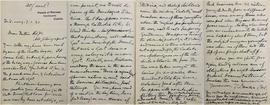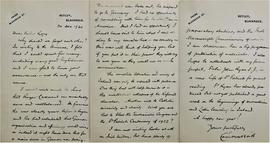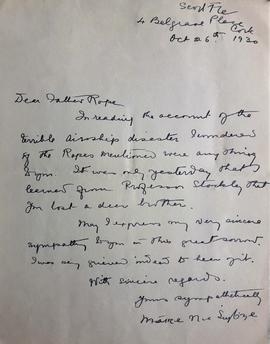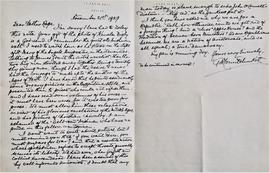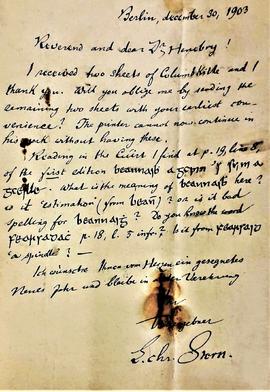- IE CA CP/3/1/3/5
- Dossier
- 1950-1951
Fait partie de Irish Capuchin Archives
A volume containing copy and draft correspondence of Fr. Senan Moynihan OFM Cap. Contains copies of Fr. Senan’s personal letters and correspondence relating to the Capuchin Publications’ Office. Manuscript annotation on the first page reads ‘Letters from Fr. Senan OFM Cap. / Private’. Includes Fr. Senan’s copy letters to Fr. Demetrius Manousos OFM Cap. (Roosevelt Avenue, Flushing, New York), Joseph O’Connor (Seosamh Ó Conchubhair), Doran Hurley, Fr. Bosco Lennon OFM Cap., Maud Gonne MacBride, Sir Gilbert Laithwaite (British Ambassador to Ireland), Liam Ruiséal (The Fountain Bookshop, Oliver Plunkett Street, Cork), Sister Mary Phelan, Fr. Sylvester OFM Cap. (Librarian, San Lorenzo Capuchin College, Rome), Roderick Wilkson (Glasgow, Scotland), Michael A. Bowles, Sister M. Bernard (Lisieux, France), Ann O’Connor (Fossa, Killarney, County Kerry), Pat Lawlor (Wellington, New Zealand), Patrick McDevitt (Glenties, County Donegal), John English & Co. (printers), Fr. Denis Fahy CSSp, Elizabeth Corr, Bishop John Dignan, Thomas MacGreevy, Aodh de Blacam, Robert Monteith, Patrick MacKenna (Maple Avenue, Hartford, Connecticut), Joseph Patrick Walshe (Irish Ambassador to the Holy See), H. Martin Hamilton, Clare Sheridan (sculptor), Fr. Gerard Fassler OFM Cap. (Mahenge Mission, Tanzania), Séamus Campbell, Páraig Ó Caoimh (Patrick O’Keeffe), Fr. Christopher Crowley OFM Cap., Johanna Coakley, Fr. Hugh Morley OFM Cap., Fr. Colman Griffin OFM Cap. (Provincial Minister, referring to the extraordinary success of ‘The Angelic Shepherd’ publication, 20 Sept. 1950), Dr. Colm A. McDonnell, Sister M. Kevin (Convent of Mercy, Ardee, County Louth), Fr. Donal O’Connor, Fr. T.F. Duggan (President, St. Finbarr’s College, Farranferris, Cork), Ellen McCann (15 Tower Hill, Armagh), Fr. Jack Hanlon, Fr. Celsus O’Shea OFM Cap., Eleanor Barnes (Lady Yarrow), Nuala Moran (Editor, ‘The Leader’), Máirín Cregan (‘Mrs James Ryan’), Adolf Morath (photographer), Pádraig De Brún, Dr. Richard Lavelle, Sister Imelda Cassidy (Loreto College, 43 North Great George’s Street, Dublin), Fr. Carmelo Durante of Sessano OFM Cap., Victor Waddington, Sister M. Dolorine (Webster College, Missouri, United States), Seumas O’Brien (sculptor, dramatist, fabulist, 1880-1959), Helena Concannon, Fr. Gilbert OFM Cap. (Provincial Curia, Capuchin Franciscan Friary, Peckham, London), Fr. H. Russell SMA (Society of African Missions, 23 Bliss Avenue, Tenafly, New Jersey), Fr. Michael J. Troy (Kimmage Manor, Dublin), J.A. Power (Blackheath Drive, Clontarf, Dublin), Br. Colmcille Cregan OFM Cap., Sister Mary Berchmans Roche (Medical Missionaries of Mary, Booterstown, Dublin), Fr. Thaddeus MacVicar OFM Cap., (refers to the death of Aodh de Blacam, 15 Jan. 1951), Bishop Daniel Cohalan (John’s Hill, Waterford), Kevin Egan (The Holy Well, Cairns, County Sligo), Kathleen Moloney (District Hospital, Edenderry, County Offaly), William Monk Gibbon, Gary Mac Eoin, Canon J. Harmon (Parochial House, Ardee, County Louth), Margaret Bowles, Fr. Donal Herlihy (Pontifical Irish College, Rome), Fr. Hilary McDonagh OFM Cap., Peter F. Anson, Fr. Jerome Hawes TOSF (Mount Alvernia Hermitage, Cat Island, Bahamas), Monsignor Martin Brenan (President, St. Patrick’s College, Carlow), Fr. Conrad Simonsen Mackey OFM Cap. (Madrid, Spain), Fr. Cuthbert Gumbinger OFM Cap., Paul Martin Dillon (‘The Evening Times’, Cumberland, Maryland, United States), Mannix Joyce, Seumas MacManus, Fr. Terence L. Connolly SJ (Boston College, Massachusetts), Fr. Celsus. O’Connell O.Cist (Mount Melleray Abbey, County Waterford), Professor Leonard Abrahamson, Seamus Murphy (Wellington Road, Cork), Fr. Henry Edward George Rope, Seán Collins, Michael F. Moynihan, Fr. Louis A. Gales (Catechetical Guild, Minnesota), Sir Shane Leslie, Sister Mary Joseph (Director, The Gallery of Living Catholic Authors, Missouri, United States), John Hennig, Sophie Raffalovich O'Brien, Sister Imelda Cassidy (Loreto College, 43 North Great George’s Street, Dublin), Willem Sassen, John Alvin Feltis (Toledo, Ohio), Cormac Breathnach, Alice Rynne (née Curtayne) (Downings House, Prosperous, Naas, County Kildare), Mary Wren, (Servite House, 17 The Boltons, London), Fr. William Purcell CM (Rector, All Hallows College, Dublin), Sr. Bernadette (St. Clare’s Convent, Harold’s Cross, Dublin, refers to the Medical Missionaries of Mary in Massachusetts, 7 Mar. 1951), Chief Superintendent Harry O’Mara, Ida Monahan, Fr. T.J. Walsh, Fr. Andrew Carew OFM Cap., Séamus Campbell, and Michael Lennon (Healthfield Road, Terenure).
Moynihan, Senan, 1900-1970, Capuchin priest



